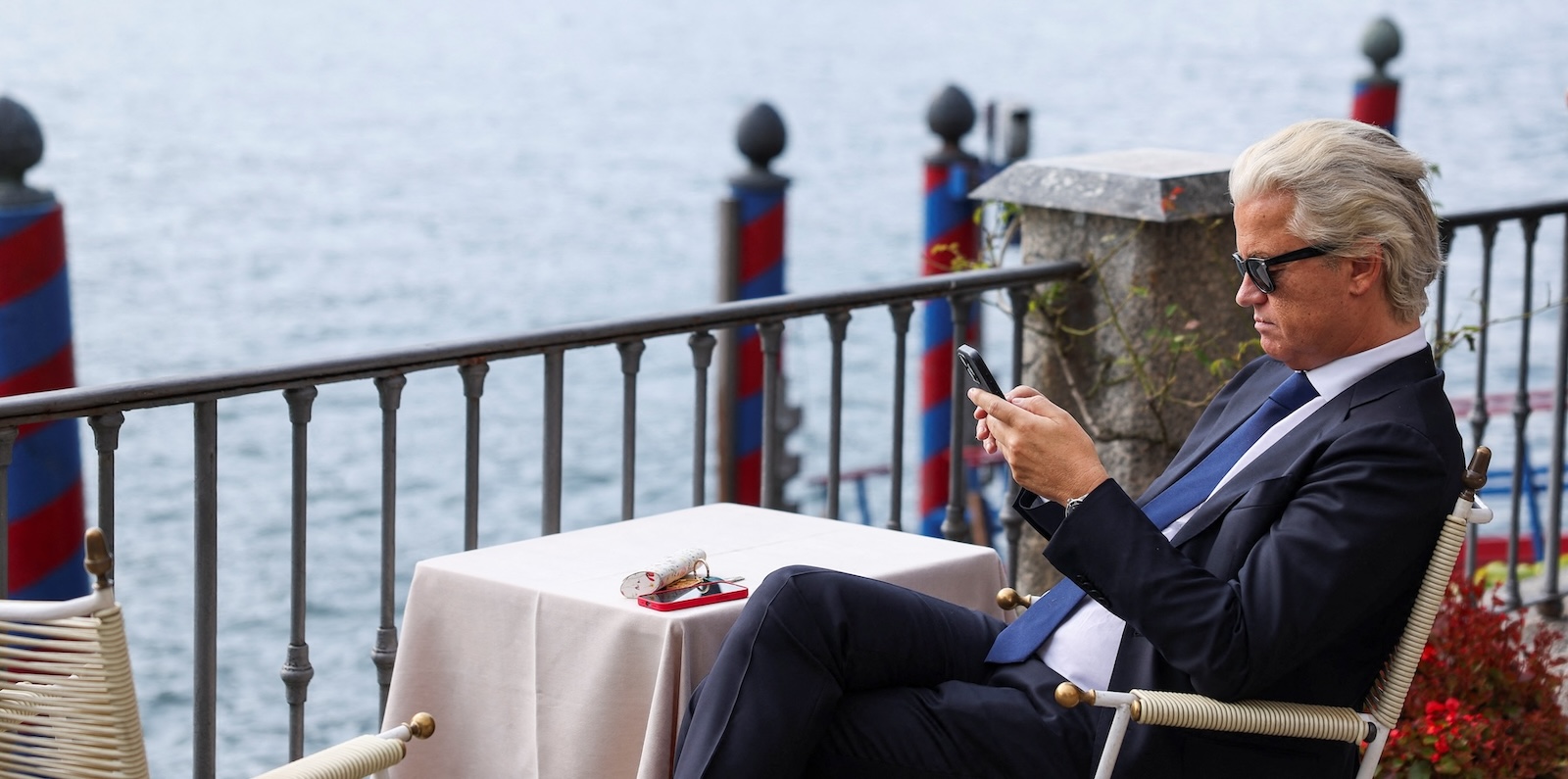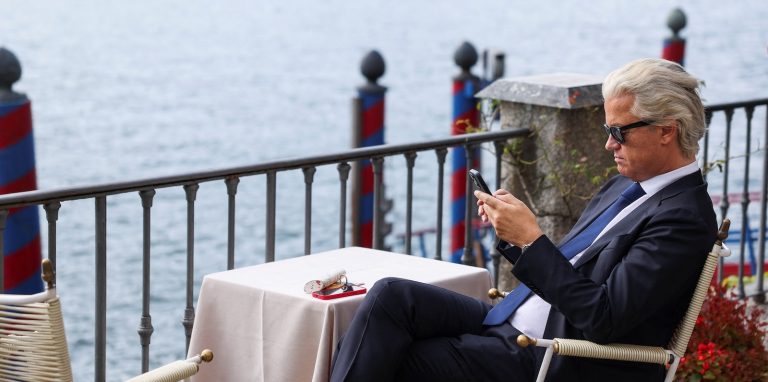Photo: Claudia Greco / Reuters / Forum 2024-09-26
Photo: Claudia Greco / Reuters / Forum 2024-09-26
For anyone who’s experienced summer in Hungary, this image might look familiar: People are sitting by the Danube. Nearby, tourists are having a beer and pálinka after an exhausting day of exploring Budapest. But here the image becomes more striking: Among them is Hungary’s regular visitor, Geert Wilders, the leader of the Dutch far-right Party for Freedom (PVV), which won the Dutch parliamentary elections in late 2023 and, following turbulent coalition talks, managed to create a government.
Wilders normally needs to be wary on his travels due to the never-ending death threats he has been receiving for over 20 years. At the beginning of September, two Pakistani religious and political leaders were convicted for advocating for Wilders’s murder and threatening his life. Nevertheless, he continues to travel – and his travels require strong security. His wife, with whom he rarely appears in public, also needs to take precautions. Many other countries don’t offer him the same level of security as Hungary, and so it is to Hungary that, over and over again, he returns.
VSquare has learned from multiple sources what the Hungarian government has now confirmed: that Geert Wilders spends time in Hungary under the auspices of Viktor Orbán’s elite bodyguards.
Belgian journalist Kasper Goethals first shared details of Wilders’s closely protected trips with VSquare. A source close to Wilders gave Goethals details about how Wilders receives special treatment because of his close relationship with Hungarian Prime Minister Viktor Orbán. His visits usually include a friendly meeting between the two.
Wilders rarely gets the red carpet treatment abroad. For example, when Wilders visited a rally in support of Tommy Robinson in the UK a few years ago, his Dutch security detail was not allowed to carry their weapons (originally, Wilders was even banned from entering the UK).
Another source – a Dutch official closely following Dutch-Hungarian relations – confirmed to VSquare that Hungarian authorities work together with their Dutch counterparts to ensure Wilders’ security. In a reply to our official request for comment, Hungary’s Ministry of Interior later added that Geert Wilders is actually protected in Hungary by the same counter-terrorism special forces that guard Orbán. “According to current legislation, certain personal protection tasks can be temporarily assigned to the Counter Terrorism Centre (TEK) by the Minister responsible for law enforcement on a case-by-case basis. This was the case with Geert Wilders,” the ministry wrote, adding that they are “not in a position to provide further information on the elements of protection and security measures.”
TEK, the security agency protecting Wilders, was created in 2010 after Viktor Orbán took power. He then appointed his long-time bodyguard, or head of his security detail, János Hajdu, as the new agency’s director-general. TEK is known to be the most loyal agency to Orbán, and is renowned not only for having the prime minister’s full trust, but also for its generous budget. TEK is in charge of protecting Orbán and certain other dignitaries – tasks previously carried out by a special unit within the Hungarian police.
Given Wilders’s frequent travels to Hungary, his need for strict security, and TEK’s involvement, Hungarian taxpayers are likely paying a hefty bill so the Dutch politician can safely vacation by the Danube.
Love for Hungary, admiration for Orbán
Wilders’s connection to Hungary begins at home with his wife, Krisztina Marfai. The two met in The Hague in 1989, where she worked at the Hungarian Embassy. Due to embassy rules, they kept their relationship secret, and only began dating publicly after she left her job. They married in Budapest and started visiting her family in Hungary. They have since spent summers at Lake Balaton.
Wilders’s personal connection to Hungary, however, goes beyond his wife. An analysis by the investigative journalism platform Follow the Money looked at the start of Wilders’s political relationship with Hungary. It was at a lunch meeting in 1995 in Huis ter Duin in Noordwijk, that Wilders, still working for the center-right People’s Party for Freedom and Democracy (VVD) international outreach branch in 1995, met Viktor Orbán – already a leader of Fidesz, which, back then, was still a liberal opposition party. They have been in frequent contact ever since. Also present at the lunch was Wilders ally Zsolt Szabó, who is also of Hungarian origin. Back then, Szabó was the country referent for Hungary at the VVD.
In early 2018, Wilders went to Hungary to promote the Hungarian translation of his book, which, at least according to his post on Facebook, became a bestseller. He published the book in the US too, but without much success. In the Netherlands and Germany he failed to find a local publisher.
In 2022, Wilders received the Hungarian Order of Merit for his support of Hungary and his efforts to stop immigration. “Hungary is a country of giants … It has fought for its freedom for centuries. Today, Hungary is a proud nation and one of the bravest in Europe, defending Christian values against cultural relativism and progressive liberal views like no other,” Wilders said when accepting the award.
Wilders’s party won the November 22, 2023 Dutch parliamentary elections, but lengthy coalition talks meant a new government wasn’t formed until July 2024. While his PVV became the senior coalition party, Wilders himself didn’t become the prime minister or a member of the cabinet, due to a lack of support from his coalition partners. Interestingly, two ministers who were delegated by PVV to the new Dutch cabinet are of Hungarian descent.
One of the Dutch cabinet ministers of Hungarian descent is the aforementioned Zsolt Szabó, who was born in Amsterdam to Hungarian parents and received a Hungarian award for his commitment to the country in 2017. Szabó, however, does not have Hungarian citizenship. He is currently the Dutch State Secretary for Digitalisation and Kingdom Relations. There is also Dirk Beljaarts, the new Minister of Economic Affairs, who was born to a Hungarian mother, had dual citizenship and served as honorary consul for Hungary. It was actually Wilders who, in 2018, stated that Dutch people with dual citizenship should lose their right to vote or take on political positions. Before entering the cabinet in June 2024, Beljaarts gave up his Hungarian citizenship.
Meanwhile, in April 2024, Geert Wilders visited Hungary not only as a casual traveler, but as a speaker at the third Conservative Political Action Conference (CPAC) in Budapest, hosted by Orbán. He was joined by right-wing Dutch influencer and activist Eva Vlaardingerbroek. He spoke, as he often does, against asylum seekers, “wokeism,” and the dictate of Brussels. In late July, Wilders was back in the country again. He shared posts from Budapest and Nyirparasznya, his wife’s hometown. Then the already friendly relationship between Wilders and Orbán deepened into an official political alliance: also in July, Wilders’s PVV joined Patriots for Europe, Viktor Orbán’s new political group in the European Parliament.
Wilders openly expresses his personal admiration for Orbán. He once wrote on X that the Hungarian prime minister “is a hero and deserves the Nobel Prize.”
Cover photo: Dutch far-right leader Geert Wilders sits by the Lake Como on the day of the European House-Ambrosetti Forum, an annual conference that gathers business and political leaders at the end of the summer, in Cernobbio, Italy, September 7, 2024.
Subscribe to “Goulash”, our newsletter with original scoops and the best investigative journalism from Central Europe, written by Szabolcs Panyi. Get it in your inbox every second Thursday!
Tamara is a journalist from Slovakia, currently based in the Netherlands. Besides VSquare, she writes for The European Correspondent.







